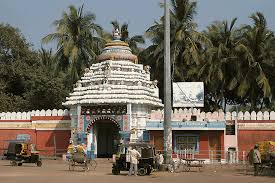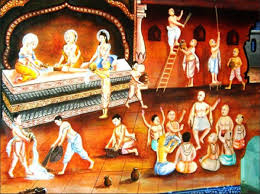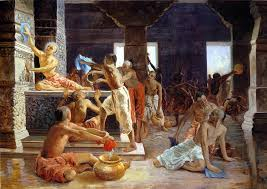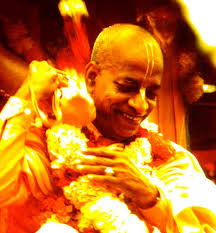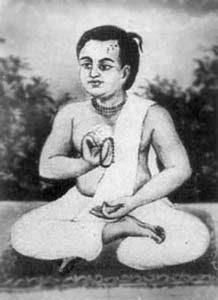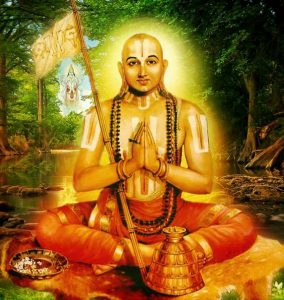Submitted by: Yasoda nandana Dasa
Sri Caitanya-caritamrta – 1975 Edition : Cc. Adi-lila : Adi 12: The Expansions of Advaita Acarya and Gadadhara Pandita : Bhaktivinoda Ṭhākura gives a summary of the Twelfth Chapter of Ādi-līlā in his Amṛta-pravāha-bhāṣya. This Twelfth Chapter describes the followers of Advaita Prabhu, among whom the followers of Acyutānanda, the son of Advaita Ācārya, are understood to be the pure followers who received the cream of the philosophy Śrī Advaita Ācārya enunciated. Other so-called descendants and followers of Advaita Ācārya are not to be recognized.This chapter also includes narrations concerning he son of Advaita Ācārya named Gopāla Miśra and Advaita Ācārya’s servant named Kamalākānta Viśvāsa. In his early life Gopāla fainted during the cleansing of the Guṇḍicā-mandira at Jagannātha Purī and thus became a recipient of the mercy of Lord Caitanya Mahāprabhu. The story of Kamalākānta Viśvāsa concerns his borrowing three hundred rupees from Pratāparudra Mahārāja to clear the debts of Advaita Ācārya, for which Śrī Caitanya Mahāprabhu chastised him when He came to know of it. Kamalākānta Viśvāsa was then purified by the request of Śrī Advaita Ācārya. After describing the descendants of Advaita Ācārya, the chapter concludes by describing the followers of Gadādhara Paṇḍita Gosvāmī.
guṇḍicā-mandire mahāprabhura sammukhe
kīrtane nartana kare baḍa prema-sukhe
SYNONYMS
guṇḍicā–mandire—in the Guṇḍicā–mandira in Jagannātha Purī; mahāprabhura—of Lord Caitanya Mahāprabhu; sammukhe—in front; kīrtane—in saṅkīrtana; nartana—dancing; kare—does; baḍa—very; prema–sukhe—in transcendental bliss.
TRANSLATION
PURPORT
The Guṇḍicā–mandira is situated in Jagannātha Purī, and every year Jagannātha, Balabhadra and Subhadrā come there from the Jagannātha temple to stay for eight days. When Lord Caitanya Mahāprabhu lived at Jagannātha Purī, every year He personally cleansed this temple with His principal devotees. The Guṇḍicā–mārjana chapter of Caitanya–caritāmṛta (Madhya 12) describes this vividly.
Sri Caitanya-caritamrta – 1975 Edition : Cc. Adi-lila : Adi 12: The Expansions of Advaita Acarya and Gadadhara Pandita : Adi 12.20 :
vidāya samaya prabhu kahilā sabāre
pratyabda āsibe sabe guṇḍicā dekhibāre
SYNONYMS
TRANSLATION
PURPORT
There is a temple named Guṇḍicā at Sundarācala. Lord Jagannātha, Baladeva and Subhadrā are pushed in their three carts from the temple in Purī to the Guṇḍicā temple in Sundarācala. In Orissa, this Ratha–yātrā festival is known as Jagannātha’s journey to Guṇḍicā. Whereas others speak of it as the Ratha–yātrā festival, the residents of Orissa refer to it as Guṇḍicā–yātrāSri Caitanya-caritamrta – 1975 Edition : Cc. Madhya-lila : Madhya 1: The Later Pastimes of Lord Sri Caitanya Mahaprabhu : Madhya 1.48
snāna-yātrā dekhi’ prabhu saṅge bhakta-gaṇa
sabā lañā kailā prabhu guṇḍicā mārjana
SYNONYMS
TRANSLATION
After seeing the bathing ceremony of Lord Jagannātha, Śrī Caitanya Mahāprabhu washed and cleaned Śrī Guṇḍicā temple with the assistance of any devotees.
Sri Caitanya-caritamrta – 1975 Edition : Cc. Madhya-lila : Madhya 1: The Later Pastimes of Lord Sri Caitanya Mahaprabhu : Madhya 1.133
sabā lañā kaila guṇḍicā-gṛha-sammārjana
ratha-yātrā-daraśane prabhura nartana
SYNONYMS
TRANSLATION
First the Lord washed the temple of Guṇḍicā very thoroughly. Then everyone saw the Ratha–yātrā festival and the Lord’s dancing before the car.
Sri Caitanya-caritamrta – 1975 Edition : Cc. Madhya-lila : Madhya 1: The Later Pastimes of Lord Sri Caitanya Mahaprabhu : Madhya 1.143
upavane kaila prabhu vividha vilāsa
prabhura abhiṣeka kaila vipra kṛṣṇadāsa
SYNONYMS
TRANSLATION
In the garden along the road from the Jagannātha temple to Guṇḍicā, Lord Caitanya Mahāprabhu performed various pastimes. A brāhmaṇa named Kṛṣṇadāsa performed the bathing ceremony of Lord Śrī Caitanya Mahāprabhu.
Sri Caitanya-caritamrta – 1975 Edition : Cc. Madhya-lila : Madhya 1: The Later Pastimes of Lord Sri Caitanya Mahaprabhu : Madhya 1.144

